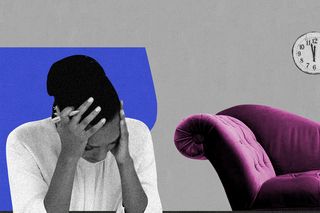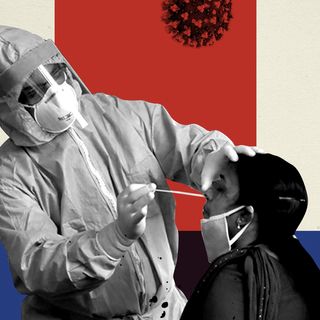
India’s Mental Health Professionals Are Burning Out Amid the Pandemic Rush on Their Services
“It all feels like nobody cares. People don’t think we’re frontline workers — we are.”

“I haven’t seen my therapist in over a month, and I miss her,” Nithya Rao says with a sigh.
Rao sounds like many people during the pandemic — uncertain, alone, in need of mental health care. There’s just one difference: Rao is a therapist herself.
The Covid19 pandemic has created a mental health crisis in India. According to a much-reported survey by the Indian Psychiatric Association, mental illness cases increased by 20% following the nationwide lockdown, and nearly one in five Indians currently have mental health struggles. In light of this, a paper published in the Asian Journal of Psychiatry warned as far back as July that “emotional contagion, perceived stress, compassion fatigue, secondary traumatic stress, poor therapeutic effectiveness, and longer duration of therapy” could strain India’s mental health care workforce to a breaking point.
That point is now. India’s mental health professionals — already in vastly short supply relative to pre-pandemic population needs — are overwhelmed, overlooked, and starting to burn out.
“The last thing I remember of 2020 is February. After that, it’s just been a blur,” says Rao, a Bangalore-based rehabilitation psychologist. She and her team have been working 14- to 16-hour days to keep up with the increased demand for therapy. At least once a day, she says, one of her colleagues breaks down after a counseling session. Across the country, mental health professionals interviewed for this article report similar emotional and physical exhaustion.
“I’ve not even had a chance to mourn my own family members,” Rao says. And “it all feels like nobody cares. People don’t think we’re frontline workers — we are. We don’t feel like we’re frontline workers — but we are.”
*
Some of the struggles mental health care providers face are common to anyone lucky enough to have a job mid-pandemic: adapting to teleconferencing, carving out a home workspace, trying to re-establish boundaries — once so clear by means of a commute — between work and home life. Added to that is the worry over infection, especially for mental health professionals working in hospitals. And the mourning for loved ones lost to Covid19.
But these struggles come with added layers of stress for mental health caregivers. The biggest strain, they say, is the constant feeling of helplessness that pervades their work during this time. No kind of mental health care training covers how to help people through a deadly worldwide pandemic and months-long lockdown. Amid an ongoing situation that has affected all aspects of life and made vulnerable millions of people, the normal tools and advice don’t work. What good is, say, cognitive behavior therapy, when your client is worrying over whether they can afford their next meal? What good is mindfulness when they’re stuck in an abusive home and can’t leave?
“‘Stay home’ is nicely told, but it’s so hard for people who have to stay home [when] home is not safe,” says Rao, whose practice caters to the LGBTQ+ community and other marginalized groups. “Witnessing that has taken a toll on our own emotional health.”
Related on The Swaddle:
UN Urges Countries to Protect People From Mental Health Crisis Amid Covid19 Pandemic
Then there are concerns about being able to provide care effectively in these times. Mental health professionals interviewed for this article say they worry whether virtual sessions can have the same therapeutic effect as in-person meetings. Others grapple with how to make in-person counseling effective and empathetic when everyone’s face is obscured by a mask. Most report stressing over how to maintain patient confidentiality during video consults with families cooped up at home, too. Some must deal with family members who stigmatize their profession and disrespect their work time. And all worry about the mental energy required to maintain their professional and personal emotional boundaries — an energy that seems to drain a little more each day.
But they have little opportunity to acknowledge and deal with these strains. As the outlet for their patients’ constant negative emotions and experiences, mental health professionals’ own emotions take a backseat.
“Nobody comes to you with happy news, right? Everyone is either sad, or cutting up themselves. It’s only negative information you’re processing. All. The. Time,” says Nandini Raman, a counseling psychologist in Chennai. The most difficult time for Raman came in June, the third month of the lockdown, when “people were peaking with isolation, loneliness, financial issues.” Then came the news of actor Sushant Singh Rajput’s suicide and the media frenzy around his death. Suddenly, all of her sessions were about self-harm and suicidal ideation — “‘What was so terrible in his life? If he can go ahead and do something like that, so can I,’” was the tone of many sessions. At her lowest point, Raman wasn’t sleeping at night and worked through the weekend handling self-harm emergencies.
“I really pulled the plug [then]. I took a three-day break where I’m just not available. ‘Here are other resources for emergency situations,'” she told her clients before going dark.
Other mental health professionals interviewed for this article said they feel guilty for taking time to rejuvenate or deal with their own emotions amid the mental health crisis.
“If I take two weeks off, 20 of my clients can’t see me. How can I take two weeks off knowing they need me?” Rao says. Rao recognizes she’s burning out and knows what she needs to do to address it, but she struggles to justify taking time to recharge — which compounds the guilt, creating a vicious cycle of emotional exhaustion. “I feel like I’m not practicing what I preach a lot of times. The dichotomy of this guilt and the passion to work with the people we care about — it’s exhausting to balance both of it.”
This kind of overcommitment can be an unconscious — and unhealthy — coping mechanism, suggests Saras Bhaskar, PhD candidate, a counseling psychologist in Chennai. Since the pandemic’s onset, Bhaskar has nearly doubled her workload, and while she’s vigilant about cutting back her services when she senses she’s overwhelmed (she is currently not taking new clients for this very reason), there was a time in her career when she wouldn’t have.
“It can be addictive, when you’re doing good and it shows,” says Bhaskar, who has practiced for 25 years. “When [clients] approach you with that trust, it can be very difficult and stressful to say no to them.”
*
Despite the overwhelming mental health burden of the pandemic, some of the profession-wide burnout could be avoidable, says Vasuki Mathivanan, PhD, a Chennai-based counseling psychologist and founder of the Indian Academy of Professional Supervisors. A more regulated field would mean a better safety net for mental health professionals. Currently, “there’s no mechanism to monitor what a practitioner is doing. There’s no role training either,” Mathivanan says. This lack of regulation translates, mid-pandemic, to a lack of support for overwhelmed practitioners struggling to tell if they’re supporting their clients in the best way possible.
Without a regulatory body, “doing supervised practice … is one way to mitigate these risks [of compassion fatigue and burnout],” she says. In a supervisory model, a practitioner is paired with a supervisor who acts as a professional sounding board as well as a monitor of the practitioner’s own mental health.
“You have a feeling that ‘I have a supervisor with which I can talk about this,’” Mathivanan says of the benefits to the model. And “as a supervisor, you’re supposed to identify if your supervisee is going through burnout or other issues.”
Related on The Swaddle:
Nearly 25% of Health Care Workers Experience PTSD During an Epidemic: Study
But Mathivanan is the only Australian Counselling Association-certified trainer of and supervisor to senior practitioners in India. In the past two years, she has trained 40 supervisors — a feat for a solo trainer who also maintains a private practice but a mere dent in the larger mental health field.
In light of the systemic gaps that plague their field, mental health carers are banding together to support their peers. Swaasthi is a newly launched mental health hotline dedicated to supporting frontline workers, including doctors, nurses, lab technicians — and mental health professionals themselves. It’s a branch of iCall, itself a 10-year-old nationwide counseling hotline operated out of the Tata Institute of Social Sciences in Mumbai. Swaasthi team leaders, who say they have each grappled with burnout themselves during the pandemic, attest to how pervasive and universal the struggles of mental health caregivers are right now.
“Burnout is a shared responsibility. It’s an ethical responsibility to be able to identify what’s happening, to seek support and resources for that,” says Tanuja Babre, the programme coordinator for Swaasthi.
*
Emotional exhaustion is an occupational hazard of mental health care. Even in non-pandemic times, studies suggest anywhere from 21 to 67% of mental health workers experience high levels of burnout. Mental health care burnout is “bad for patient care and is economically wasteful,” concludes other research. Occupational burnout in general, regardless of field, can take years to recover from and affect not just current but also future work performance. As vaccines roll out to curtail the spread of Covid19, a battered world starts to look more optimistically toward the future. But mental health care workers are worried. Who provides care when the carers can’t anymore?
“If these mental health professionals themselves are going through burnout, then it is going to have an impact, one, on their own wellbeing, and then, on their professional contribution,” Bhaskar says. “Public [mental] health will be neglected and multiplied. The post-pandemic rebound will be much harder — and that thought is what is scaring me.”
If you are a mental health professional struggling with burnout, support from trained counselors is available through Swaasthi at 9152987824. The hotline operates 10 am – 6 pm, Monday through Friday, and offers services in Hindi, English, Marathi, and Malayalam.
Liesl Goecker is The Swaddle's managing editor.
Related


Data Gaps on Sex Differences in Covid19 Infections Could Hamper Treatment, Vaccination, Report Says
